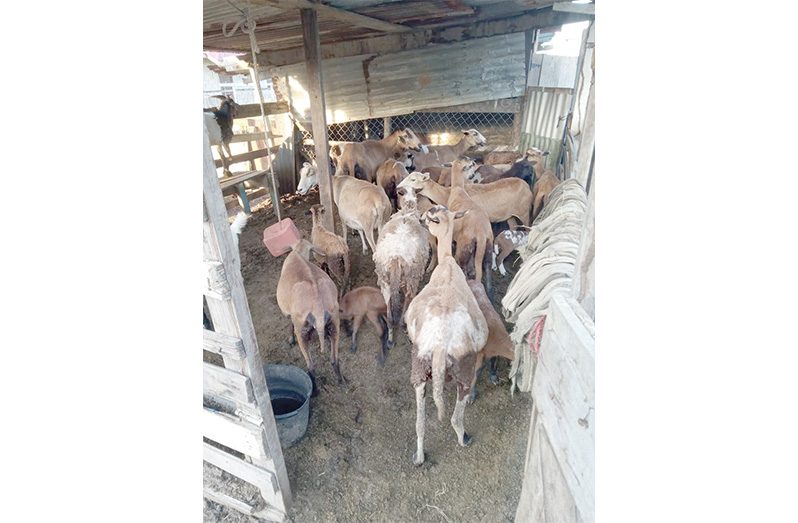– Agricola resident spearheads thriving backyard dairy operation
– uses modern practices, GLDA guidance to keep cows healthy, produce ‘clean’ milk
AMID the clattering trucks, the hum of oil rigs, and the relentless pace of Georgetown’s East Bank of Demerara, a small patch of green defies the industrial rhythm.
In the village of Agricola, 60-year-old Ricky Todd has carved out a thriving dairy operation in his own backyard—a verdant “island” of cattle, forage, and daily milk production surrounded by factories, warehouses, and oil service providers.
Here, amidst steel and concrete, Todd tends to his cows with care, supplying fresh, wholesome milk to a growing base of loyal consumers.
“I take pride in ensuring the quality of the milk I sell is excellent. It is a real joy to rear cattle for me. This is my contribution to the country,” Todd said as he surveyed his herd.
BUILDING A SOLID FOUNDATION
Todd’s journey began in 1991 with four cows, two Holsteins from the now-defunct Versailles Dairy Project and two Brown Swiss. Over the years, he has been able to expand his herd through artificial insemination (AI), a practice that reduced costs and ensures high-quality genetics.
“For me, working with Mr. Lindon Stanley, Senior AI Technician from GLDA, has been invaluable. Our collaboration has strengthened my herd, which now includes primarily dairy breeds such as Brown Swiss and Holstein X,” Todd explained.
Today, Todd’s modest pen houses 13 cows, with five milking animals producing roughly six gallons of milk daily. Every drop is sold to repeat customers who value freshness, safety, and traceability.

MODERN BREEDING PRACTICES
Todd has embraced the Guyana Livestock Development Authority’s (GLDA) embryo transfer programme, which uses advanced reproductive technology to improve livestock genetics rapidly.
He has already identified his two-year-old cow, Jasmine, as a surrogate.
“I feel comfortable participating in the embryo transfer programme because GLDA’s team guides me at every step. Their support ensures I understand and follow each procedure correctly, which is crucial for the success of my herd,” he said.
NUTRITION WITHOUT PASTURES
Unlike traditional cattle farms with sprawling pastures, Todd’s urban operation thrives on ingenuity.
With no grazing land available, he practices cut-and-carry feeding which means fresh grass must be brought in daily. This is complimented by silage and molasses–urea blocks he learned to make in GLDA workshops.
“This system keeps my animals healthy and productive all year round,” Todd explained. “Even during floods or dry spells, I know they have sufficient food. The knowledge I gained from GLDA has been essential; it allows me to feed my herd properly and efficiently.”
Todd’s method demonstrates that intensive, well-managed feeding can sustain a dairy operation in the heart of an industrial zone, turning limited space into a productive, green oasis.
CLEAN MILK FOR CUSTOMERS
Maintaining hygiene and food safety is central to Todd’s operation. As a participant in GLDA’s Clean Milk Initiative, he follows rigorous protocols for milking, handling, and storage, ensuring every drop meets strict safety standards.
His cows are tagged and monitored for traceability, a critical step increasingly required for local and international markets.
“I am grateful for GLDA’s support through the Clean Milk Initiative,” Todd said. “It equips me to provide consumers with wholesome, hygienically produced milk. I understand that safe milk is not just a product—it’s a responsibility.”

STANDARDS, TRAINING, MARKET ADVANTAGE
Through GLDA seminars and hands-on workshops, Todd has refined his farm management practices, learning everything from pasture management principles to meticulous record-keeping.
These skills not only enhance productivity but also give him a competitive edge, as traceability and quality standards become vital for regional trade.
“It is a real joy to rear cattle for me,” Todd said. “This is my contribution to the country—we can become a powerhouse in exporting meat and milk. Knowledge, training, and proper standards are what make that possible, even for a small-scale farmer like me.”
EXPANSION ON THE HORIZON
Though confined to his backyard in Agricola for now, Todd’s ambitions extend beyond the urban pen.
He has access to land at Plantation Providence, East Bank Demerara, where he plans to establish pastures and expand his herd.
Open grazing will reduce the daily need to source cut grass and silage and increase milk production to meet the growing demand.
“I will be moving to Plantation Providence to create pasture for open grazing,” Todd told this publication adding, “It will ease the stress of bringing in feed daily and allow me to scale up production. Even with modest beginnings, there’s room to grow.”
Todd’s farm is a striking anomaly in Agricola. The hum of trucks and the noisy workshops contrast sharply with the quiet rhythm of his cows, the rustling of cut grass, and the measured flow of fresh milk.
In this small urban space, Todd proves that agriculture can coexist with industry. His operation shows that even minimal land, when paired with knowledge, innovation, and careful management, can produce safe, nutritious milk and sustain livelihoods.
A MICROCOSM OF NATIONAL POTENTIAL
Todd sees his farm as more than a personal endeavour; it reflects the broader promise of Guyana’s livestock sector.
“Guyana is a sleeping giant in the livestock industry,” he said. “With modern technology, farmer training, and government support, we can meet domestic demand and tap export markets.”
Though landless, Todd demonstrates that small-scale farmers can contribute significantly to national food security.
His yard-based system embodies profitability, adaptability, and sustainability—qualities essential as Guyana scales up livestock production.
With every gallon of milk carefully recorded, Todd’s operation mirrors the potential of a nation ready to embrace innovation and growth.
“It is a real joy to rear cattle for me,” Todd reflected. “We can become a powerhouse in exporting meat and milk, but it starts with every farmer, big or small, doing their part the right way.”



.jpg)








